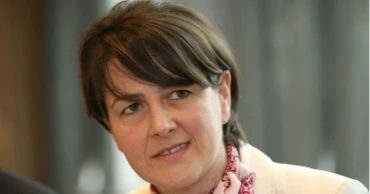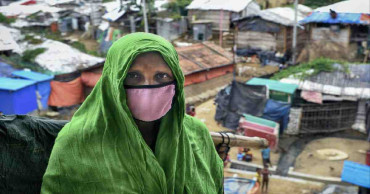UN Special Rapporteur
Bangladeshi Migrant Workers: Destination countries “must act against perpetrators” of HR violations
The UN Special Rapporteur on the rights of migrants, Felipe González Morales, on Tuesday said destination countries – most of them in the Middle East – must take an active role in “investigating and sanctioning perpetrators of human rights violations” against Bangladeshi migrant workers.
At the same time, Bangladesh should continue reinforcing its consular services, he added.
"Bangladesh must step up efforts to strengthen regulation of the migrant recruitment system to protect migrant workers against exploitation and abuses," the UN Rapporteur told reporters at a press conference in Dhaka at the end of a 10-day official visit to Bangladesh.
In his preliminary observations, the UN expert said despite the positive economic contributions migrant workers bring to the local economy and the existence of necessary legislation and policy, many flaws still exist in the recruitment system which adversely impact the rights of migrant workers. “These challenges exist at all stages of migration.”
He will present a full report on his visit, including findings and recommendations, to the UN Human Rights Council in June 2023.
Read more: ‘Over 51,000 migrants die, thousands go missing in 8 years’
Morales stressed on strengthening monitoring and coordination to promote regular migration and help stop human trafficking.
“Recruitment currently imposes exorbitant high costs on many migrants, creating debt bondage, much of which is imposed by “middlemen” who are used to recruit workers,” he said.
He urged authorities to protect the rights of migrant workers at all stages of migration, including pre-departure, during employment abroad and upon their return.
The Special Rapporteur commended the government for actions taken to curb these challenges, but said there was still a need to regulate, closely monitor and enhance the recruitment system to ensure effective protection for migrants, including better access to justice.
The expert noted the stark difference in skilled migration schemes channeled through government-to-government initiatives, which yield more beneficial results for migrants due to more robust regulation and oversight.
“It is the lower-skilled migrants who are often subject to vulnerable situations, including exploitation, as they are often poor, lack education and without access to information that can help inform their decisions and enhance their migration experiences,” Morales said.
Read more: Swift return of irregular migrants to help promote legal migration: European Commissioner
The Special Rapporteur encouraged ongoing training initiatives for aspiring migrant workers but stressed the need to better equip them with adequate information prior to departure, including recourse when they suffer abuse.
He welcomed the establishment of a database of aspiring migrant workers as well as better regulation of middlemen, including requirements for registration.
Morales emphasised that responsibility for migrant workers equally falls on countries of destination.
“These countries must do their part in ensuring strong protection for migrant workers, particularly women who are disproportionately at risk of human rights violations when they are hired as domestic workers,” he said.
Durable Solution for All Rohingyas Critical
During his visit, the Special Rapporteur travelled to Cox’s Bazar to meet with Rohingya refugees.
Morales praised Bangladesh for receiving nearly one million Rohingyas escaping from Myanmar and said he was impressed by the resilience of the Rohingya refugees – some of whom have been living in camps for over five years, and others 30 years since first arrivals in the early 1990s.
“A durable solution for all Rohingya refugees is critical,” the UN expert said. He expressed concern about the lack of legal status for Rohingyas, and noted that children who are born in the camps he visited are not issued an official birth certificate.
The expert also called on the authorities to facilitate permits to improve access to education through learning centers and life skills training which many Rohingyas have praised and welcomed as a means to a more hopeful and dignified life.
The UN rapporteur said it is important to enhance coordination among the agencies engaged to address the challenges. "It's a tremendous challenge."
He also noted the need to upgrade the quality of housing in the camps particularly in light of the impact of climate change that have resulted in fire and flooding incidents.
3 years ago
UN Special Rapporteur will assess rights violation in trafficking during official visit to Bangladesh
UN Special Rapporteur Siobhán Mullally will assess the human rights issue of trafficking in persons during a ten-day official visit to Bangladesh that began on Monday.
“I will pay particular attention to the main challenges to ensuring the human rights of victims, and effective prevention of trafficking,” Mullally said.
The Special Rapporteur’s will present a comprehensive report of her visit to the UN Human Rights Council in June 2023.
A particular concern will be the risks of trafficking in the labour migration context, as well as risks faced by refugees, asylum seekers and stateless persons, she said.
Trafficking for purposes of sexual exploitation and concerns in relation to child trafficking for all forms of exploitation will also be examined, as will climate-related displacement and increased risks for those directly affected, particularly women and girls in rural areas, and indigenous peoples.
“Measures to combat impunity for trafficking in persons, and ensure effective investigations, with participation of victims, including through child friendly justice procedures, will be examined,” she said.
The special rapporteur will travel to Dhaka, Cox’s Bazar and Sylhet. She will meet representatives of government agencies, as well as UN officials, law enforcement bodies, members of civil society organisations and survivors.
The special rapporteur will hold a press conference to share her preliminary observations on November 9.
3 years ago
"Bangladesh should not have to carry the burden of climate change alone"
UN Special Rapporteur on the promotion and protection of human rights in the context of climate change Ian Fry has said the major greenhouse emitting countries have a clear obligation under international law to provide funding to help highly vulnerable countries like Bangladesh to recover from the impacts of climate change."Bangladesh should not have to carry the burden of climate change alone," the UN expert said on Thursday, calling for an international fund to help the South Asian country to recover from the impacts of extreme weather events.He visited some of the most adversely affected regions of Bangladesh and said it is clear to him that the burden of climate change should not be carried by Bangladesh alone.
Read What can COP27 do for climate vulnerable countries?“For too long, major emitting countries have denied their responsibility for the suffering they are causing. This must end," said the UN Special Rapporteur.In a statement at the end of his 10-day visit to Bangladesh to study the impact of climate change in the South Asian nation, Fry said the international community must immediately establish a loss and damage fund to finance the recovery of climate change-affected States.
Fry said women carried an enormous burden of climate change impacts, walking long distances to fetch fresh water, which put them at risk of sexual harassment and kept them from childcare and farming.
Read Aid pours into Pakistan; deaths from floods cross 1,200 markAccording to the Special Rapporteur, women lost livestock, crops and stored seeds in the flash floods of Sylhet, in northeast Bangladesh, and it would take the community at least two years to fully recover.During his visit, the UN expert held meetings online with indigenous peoples who expressed grave concerns about their future, as the logging of their land was destroying traditional livelihoods and making it harder to find freshwater, food and medicine.The logging was a violation of the Bangladesh government’s own programme to Reduce Emissions from Deforestation and forest Degradation (REDD+), the Special Rapporteur said.
Read: UN human rights expert on climate change to visit Bangladesh from Sept 4-15
The government refuses to recognise that these communities are indigenous, and their plight was therefore being ignored, he said.“The issue of climate change displacement was deeply disturbing for me. Millions of people suffering from hardship caused by climate change are migrating to cities to seek other opportunities,” the expert said.“Inevitably these people end up in the slum areas of the major cities, where their basic rights are being denied,” he said.
Read Dangerous heat predicted to hit 3 times more often in futureThe Special Rapporteur said he had received reports that the situation of children in urban slums was particularly dire.“They suffer high rates of malnourishment, school drop-out, child marriage, child labour and abuse,” he said.Fry said he also met with climate change activists who claimed they were being persecuted by the government for protesting against new coal-fired power plants.
Read Northeastern farmers face new challenges with severe drought“The government appears to be using the Digital Protection Act to suppress the voice of climate activists. This is a gross overreaction. People have the right to express their views without being referred to as ‘terrorists’, the UN expert said.Fry will present a report to the UN General Assembly in 2022, focused on the promotion and protection of human rights in the context of climate change mitigation, loss, damage and participation – an issue he said was brought sharply into focus during his visit to Bangladesh.A full report on his visit to Bangladesh will be presented to the Human Rights Council in June 2023.
Read Climate change wipes out $525 bn over last 2 decades: Report
3 years ago
CVF happy getting UN Special Rapporteur on HR
The Climate Vulnerable Forum (CVF), led by Bangladesh, has appreciated the creation of a position of UN Special Rapporteur to play a dedicated role in protecting and promoting human rights in the context of climate crisis.
The position was created at the Human Rights Council (HRC) in Geneva through a resolution at the 48th Session of the UN’s supreme body for human rights.
Speaking for the Climate Vulnerable Forum Presidency, Foreign Minister Dr AK Abdul Momen welcomed the adoption of resolution on the mandate of the new HRC special rapporteur on the promotion and protection of human rights in the context of climate change.
He said this was a proud achievement for the people of the world’s most climate threatened nations, where many of them are being deprived of their rights to life and decent living due to climate change-related displacement.
From the outset of Bangladesh’s presidency, pursing this mandate had been a top priority, said the Foreign Minister.
Read: Hasina’s climate leadership lauded at CVF-COP26 dialogue
In the CVF nations, 1.2 billion people are facing threats to the enjoyment of their fundamental human rights through climatic consequences, including sea-level rise, river erosion, salinity increase, floods and draughts that claim lives, livelihoods and displace people from their ancestral homes and traditional jobs.
Dr Momen extended thanks to the Members of the Human Rights Council for supporting the long overdue and critical resolution to create this mandate.
He also expressed his sincere thanks to the CVF Secretariat for their efficient support and useful advice to the CVF Presidency and all Member States of the CVF.
CVF’s Thematic Ambassador for Vulnerability, Saima Wazed; the Speaker of the Maldives People’s Majlis, and former President of Maldives Mohamed Nasheed who is now the CVF Thematic Ambassador for Ambition; and Tosi Mpanu Mpanu, Chair of the UNFCCC Subsidiary Body for Scientific and Technological Advice (SBSTA) and CVF Thematic Ambassador for Renewable Energy also welcomed the decision taken by the UN Human Rights Council to establish the post of the Special Rapporteur on Human Rights and climate change.
Read: Help achieve green recovery of CVF-V20 countries: Hasina to developed nations
The new mandate responds to repeated calls, first initiated by the CVF in 2019, and from wide-ranging climate-vulnerable countries, small island developing countries, least developed countries, low-lying countries, and landlocked countries at the forefront of the climate-change crisis.
A joint statement led by Bangladesh at the 46th HRC session in March 2021 calling for the creation of the special rapporteur was supported by 54 states.
The resolution adopted on 8 October 2021 emphasises the need for a continued focus on addressing the adverse consequences of climate change for all, particularly in developing countries and for the people whose situation is most vulnerable to climate change.
4 years ago
Myanmar: UN expert urges emergency summit to head off deepening crisis
The UN Special Rapporteur on the situation of human rights in Myanmar, Tom Andrews, has warned that the pace and scope of the international response to the military coup in Myanmar is falling short of what is required to head off a deepening crisis.
Andrews on Thursday called on UN Member States, including those in the Association of Southeast Asian Nations, the European Union, the United States and China, to hold an emergency summit of all stakeholders, including the duly elected illegally deposed parliamentarians who make up the Committee Representing Pyidaungsu Hluttaw (CRPH).
“Conditions in Myanmar are deteriorating,” he said, “but they will likely get much worse without an immediate robust, international response in support of those under siege.
“It is imperative that the international community heed the recent call of UN Secretary-General António Guterres for a ‘firm, unified international response’,” Andrews said.
Also Read: UN: 38 died on deadliest day yet for Myanmar coup opposition
To date, however, the limited sanctions imposed by Member States do not cut the junta’s access to revenue that help sustain its illegal activities, and the slow pace of diplomacy is out of step with the scale of the crisis.
“The incremental approach to sanctions has left the most lucrative business assets of the junta unscathed. It needs to be replaced by robust action that includes a diplomatic offensive designed to meet the moment," he said.
Andrews stressed that he is receiving reports indicating that the situation in Myanmar is in danger of spiralling further out of control and warned of a dramatic increase in loss of life.
“Without a focused, diplomatic solution, including the hosting of an emergency summit that brings together Myanmar’s neighbours and those countries with great influence in the region, I fear the situation of human rights in Myanmar will further deteriorate as the junta increases the rate of murders, enforced disappearances and torture,” he said.
Andrews said it is critical that the people of Myanmar, the CRPH, and opposition leaders and activists see that the international community is working towards a diplomatic solution in support of the peaceful Civil Disobedience Movement.
Also read: UN official: Myanmar people want UN sanctions, peacekeepers
This combined course of action — domestic peaceful resistance, sustained pressure, and international diplomatic momentum — will have a greater chance for success than taking up arms and will save untold numbers of lives.
“Member States have an opportunity to demonstrate this alternative, but the window in which this can be achieved is closing rapidly. I fear that the international community has only a short time remaining to act," he said.
4 years ago
Int'l community's policy towards Rohingyas failed: UN expert
The UN Special Rapporteur on the situation of human rights in Myanmar Tom Andrews on Thursday said the international community must acknowledge that after three years its policy with respect to the Rohingya refugees has failed.
5 years ago
Myanmar questioned for not fulfilling Rohingya repatriation pledge
The UN Special Rapporteur on the situation of human rights in Myanmar, Thomas Andrews, has questioned Myanmar for not fulfilling its commitment over Rohingya repatriation.
5 years ago
UN experts urge to lift unilateral sanctions amidst COVID-19 pandemic
A group of United Nations (UN) experts has called for the lifting of all unilateral sanctions, so that people in countries under sanctions can protect themselves against COVID-19.
5 years ago




.jpg)
.jpg)






